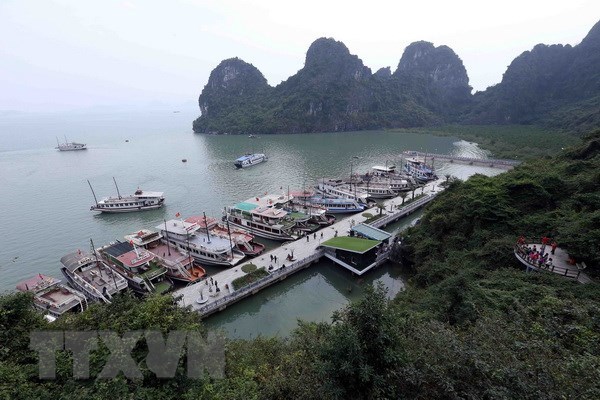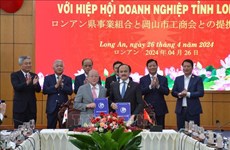Quang Ninh strives to remain top position in PCI ranking
The northeastern province of Quang Ninh is sparing no efforts to maintain its top position in the provincial competitiveness index (PCI), said Chairman of the provincial People’s Committee Nguyen Duc Long.
 A corner of Quang Ninh (Source: VNA)
A corner of Quang Ninh (Source: VNA) Quang Ninh (VNA) – The
northeastern province of Quang Ninh is sparing no efforts to maintain its top
position in the provincial competitiveness index (PCI), said Chairman of the
provincial People’s Committee Nguyen Duc Long.
Last year, Quang Ninh, for the first time ever, became the most competitive province in the country, topping Vietnam’s PCI 2017, with 70.7 out of 100 points.
Long asked provincial departments, sectors, and localities to avoid idleness just because of the results achieved, and instead continue with reforms. He urged that they stay vigilant, finding innovative solutions to achieve the targets set by the Government’s resolution on continuing the implementation of main tasks and measures to improve the business environment and the provincial People’s Committee’s plan issued on April 17.
Related agencies and Vice Chairpersons of the provincial People’s Committee should find measures to improve indexes, particularly in terms of transparency, informal expenses, legal institutions, and land access.
He urged public centres at all levels to solve administrative procedures as soon as possible.
Localities, departments, and sectors were also requested to make information connections to the provincial e-portal to raise publicity and transparency.
The leader asked the provincial Business Association to coordinate well with departments, sectors, and localities in implementing measures to improve the business and investment environment and competitiveness, and in supporting startup enterprises and forming industrial clusters.
Taking ideas from the PCI, the province launched the Department and District Competitiveness Index (DDCI) in 2015.
The index measures the efficiency of economic management of the local government through eight criteria, including transparency, proactivity of leadership, time costs of regulatory compliance, informal charges, policy bias, legal institutions, business support and accountability of leaders.
The DDCI was officially implemented in 21 departments and 14 localities across the province in 2016, according to deputy head of the provincial board for investment promotion and support Vu Thi Kim Chi.
The programme helps the province identify shortcomings and improve the quality of economic governance of local authorities and departments, Chi said, adding that this creates competition on management quality and aids administrative reform.
Furthermore, the DDCI creates a widespread, transparent and reliable channel for businesses and investors to give feedback to local authorities and increases the role and responsibility of the business community in building a local management apparatus.
After two years of implementation, the programme has brought positive outcomes. Businesses are required to build annual action programmes on improving investment environment, the PCI and DDCI.
The province only attracted 3.39 billion USD in the 15 years from 1986 to 2011. However, foreign direct investment (FDI) poured into Quang Ninh in 2012-2017 exceeded 3 billion USD, raising total foreign investment to the locality to more than 6 billion USD, Chi said.
The presence of major investors at home and abroad such as the US, Japan, Singapore and Thailand has created strong momentum for the local economy, she added.
The province has taken measures to reform administrative procedures, reduce production costs for businesses and create an environment for them to enhance competitiveness.
Every three months, local authorities meet with enterprises to note their opinions and remove bottlenecks.
In 2017, the province piloted the implementation of social network analysis in 16 agencies, expanding interaction with the business community, according to Chi.
Speaking at a recent conference on evaluating the local Public Administrative Reform (PAR Index), Satisfaction Index of Public Administration Services (SIPAS), and Public Administration Performance Index (PAPI) in 2017, Secretary of the provincial Party Committee Nguyen Van Doc said the province will further its efforts to hasten administrative reform in 2018.
“Quang Ninh will continuously work to maintain its position among the top performers of those indexes,” he said.
He instructed sectors and branches to press ahead with administrative procedure reforms, enhance the efficiency of public administrative centres, cut unnecessary administrative procedures, complete e-Government apparatus and pay provide training for public servants.
The PCI report has been produced annually since 2005 to assess the ease of doing business, economic governance and administrative reform efforts by provinces and cities in Vietnam.
The 2017 PCI Report is the 13th iteration and is based on responses from 12,000 enterprises, including more than 10,200 domestic private enterprises from 63 cities and provinces and nearly 1,800 foreign invested enterprises in 21 provinces nationwide.
According to the report, Quang Ninh was followed closely by central Da Nang city (70.1 points). The Mekong Delta province of Dong Thap ranked third with 68.8 points.–VNA
Last year, Quang Ninh, for the first time ever, became the most competitive province in the country, topping Vietnam’s PCI 2017, with 70.7 out of 100 points.
Long asked provincial departments, sectors, and localities to avoid idleness just because of the results achieved, and instead continue with reforms. He urged that they stay vigilant, finding innovative solutions to achieve the targets set by the Government’s resolution on continuing the implementation of main tasks and measures to improve the business environment and the provincial People’s Committee’s plan issued on April 17.
Related agencies and Vice Chairpersons of the provincial People’s Committee should find measures to improve indexes, particularly in terms of transparency, informal expenses, legal institutions, and land access.
He urged public centres at all levels to solve administrative procedures as soon as possible.
Localities, departments, and sectors were also requested to make information connections to the provincial e-portal to raise publicity and transparency.
The leader asked the provincial Business Association to coordinate well with departments, sectors, and localities in implementing measures to improve the business and investment environment and competitiveness, and in supporting startup enterprises and forming industrial clusters.
Taking ideas from the PCI, the province launched the Department and District Competitiveness Index (DDCI) in 2015.
The index measures the efficiency of economic management of the local government through eight criteria, including transparency, proactivity of leadership, time costs of regulatory compliance, informal charges, policy bias, legal institutions, business support and accountability of leaders.
The DDCI was officially implemented in 21 departments and 14 localities across the province in 2016, according to deputy head of the provincial board for investment promotion and support Vu Thi Kim Chi.
The programme helps the province identify shortcomings and improve the quality of economic governance of local authorities and departments, Chi said, adding that this creates competition on management quality and aids administrative reform.
Furthermore, the DDCI creates a widespread, transparent and reliable channel for businesses and investors to give feedback to local authorities and increases the role and responsibility of the business community in building a local management apparatus.
After two years of implementation, the programme has brought positive outcomes. Businesses are required to build annual action programmes on improving investment environment, the PCI and DDCI.
The province only attracted 3.39 billion USD in the 15 years from 1986 to 2011. However, foreign direct investment (FDI) poured into Quang Ninh in 2012-2017 exceeded 3 billion USD, raising total foreign investment to the locality to more than 6 billion USD, Chi said.
The presence of major investors at home and abroad such as the US, Japan, Singapore and Thailand has created strong momentum for the local economy, she added.
The province has taken measures to reform administrative procedures, reduce production costs for businesses and create an environment for them to enhance competitiveness.
Every three months, local authorities meet with enterprises to note their opinions and remove bottlenecks.
In 2017, the province piloted the implementation of social network analysis in 16 agencies, expanding interaction with the business community, according to Chi.
Speaking at a recent conference on evaluating the local Public Administrative Reform (PAR Index), Satisfaction Index of Public Administration Services (SIPAS), and Public Administration Performance Index (PAPI) in 2017, Secretary of the provincial Party Committee Nguyen Van Doc said the province will further its efforts to hasten administrative reform in 2018.
“Quang Ninh will continuously work to maintain its position among the top performers of those indexes,” he said.
He instructed sectors and branches to press ahead with administrative procedure reforms, enhance the efficiency of public administrative centres, cut unnecessary administrative procedures, complete e-Government apparatus and pay provide training for public servants.
The PCI report has been produced annually since 2005 to assess the ease of doing business, economic governance and administrative reform efforts by provinces and cities in Vietnam.
The 2017 PCI Report is the 13th iteration and is based on responses from 12,000 enterprises, including more than 10,200 domestic private enterprises from 63 cities and provinces and nearly 1,800 foreign invested enterprises in 21 provinces nationwide.
According to the report, Quang Ninh was followed closely by central Da Nang city (70.1 points). The Mekong Delta province of Dong Thap ranked third with 68.8 points.–VNA













